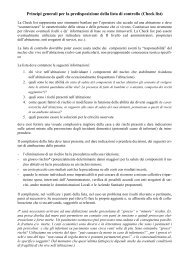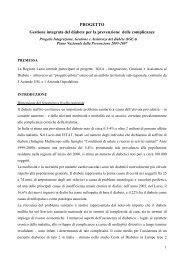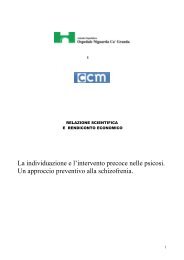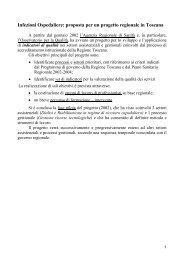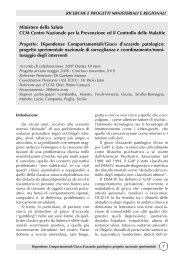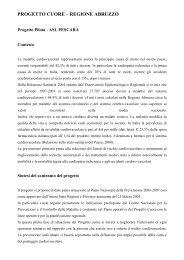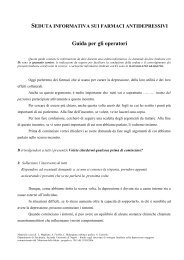Gaining health : analysis of policy development in European ...
Gaining health : analysis of policy development in European ...
Gaining health : analysis of policy development in European ...
You also want an ePaper? Increase the reach of your titles
YUMPU automatically turns print PDFs into web optimized ePapers that Google loves.
dur<strong>in</strong>g <strong>policy</strong> formulation. Naturally, they tend to focus on<br />
their own area <strong>of</strong> expertise and, <strong>in</strong> some cases, have played<br />
a highly visible role <strong>in</strong> gett<strong>in</strong>g attention for NCD problems<br />
through collaboration with the media. The focus <strong>of</strong> those<br />
deal<strong>in</strong>g with diseases rather than lifestyles and NCD risk<br />
factors can lean more towards <strong>health</strong> care and medical<br />
models <strong>of</strong> <strong>policy</strong> <strong>development</strong> rather than <strong>health</strong> promotion.<br />
A small but eloquent elite group <strong>of</strong> NGOs, ow<strong>in</strong>g to their<br />
strength and <strong>in</strong>fluence, sometimes dom<strong>in</strong>ates the debate or<br />
is given a lead<strong>in</strong>g role by <strong>policy</strong>-makers. In Hungary, for example,<br />
the Prime M<strong>in</strong>ister commissioned competent NGOs<br />
to prepare the first drafts <strong>of</strong> the heart <strong>health</strong> and cancer<br />
programmes.<br />
The general public <strong>of</strong>ten has less <strong>in</strong>formation on the <strong>health</strong><br />
situation and little <strong>in</strong>put to the <strong>policy</strong> formulation process.<br />
However, surveys such as the EU Eurobarometer and the<br />
<strong>in</strong>creas<strong>in</strong>g use <strong>of</strong> op<strong>in</strong>ion polls are br<strong>in</strong>g<strong>in</strong>g to the fore the<br />
weight given by people <strong>in</strong> Europe to various <strong>health</strong> <strong>policy</strong><br />
issues.<br />
Certa<strong>in</strong> key players have had a decisive role throughout<br />
the <strong>policy</strong> cycle <strong>in</strong> the countries studied. Particularly <strong>in</strong> the<br />
smaller countries, they frequently play multiple roles as<br />
advocates, leaders <strong>in</strong> the <strong>policy</strong> formulation process and<br />
participants <strong>in</strong> monitor<strong>in</strong>g and evaluation. Those who have<br />
been <strong>in</strong> place for a number <strong>of</strong> years became a guarantee<br />
<strong>of</strong> <strong>policy</strong> susta<strong>in</strong>ability. Some have dom<strong>in</strong>ated the scene for<br />
the last two decades, and their successors are not clearly<br />
evident.<br />
WHO and the EU have also played a vital role <strong>in</strong> stimulat<strong>in</strong>g<br />
the <strong>development</strong> <strong>of</strong> <strong>health</strong> policies and strategies. Their<br />
documents shape norms for the behaviour <strong>of</strong> national<br />
governments by creat<strong>in</strong>g <strong>in</strong>ternational expectations to<br />
develop NCD policies. All <strong>in</strong>ternational agencies <strong>in</strong> this field<br />
have a strong concern for equity, and have gradually created<br />
<strong>in</strong>terest <strong>in</strong> tackl<strong>in</strong>g the social and economic determ<strong>in</strong>ants <strong>of</strong><br />
<strong>health</strong>. The EU fund<strong>in</strong>g systems, <strong>in</strong>clud<strong>in</strong>g programmes to<br />
fight poverty and social exclusion, also stimulate the l<strong>in</strong>k <strong>of</strong><br />
<strong>health</strong> and <strong>development</strong> <strong>in</strong> the area <strong>of</strong> NCD policies. The<br />
EU structural funds <strong>of</strong>fer a unique and important fund<strong>in</strong>g<br />
opportunity and create special <strong>in</strong>terests. This is characteristic<br />
for recent practices <strong>in</strong> Greece and Hungary, for example.<br />
The role <strong>of</strong> <strong>in</strong>ternational organizations can sometimes be<br />
controversial, however. In the Balkan countries and the<br />
countries emerg<strong>in</strong>g from the former USSR, the <strong>development</strong><br />
<strong>of</strong> a public <strong>health</strong> <strong>policy</strong> was negotiated as a condition<br />
<strong>of</strong> a World Bank loan. In some cases, <strong>health</strong> <strong>policy</strong> documents<br />
were actually written by <strong>in</strong>ternational experts and<br />
the result<strong>in</strong>g lack <strong>of</strong> ownership <strong>in</strong> the countries <strong>in</strong> question<br />
meant that these strategies rema<strong>in</strong>ed on the shelf. The<br />
experience <strong>of</strong> Albania and Kyrgyzstan clearly shows both<br />
the outstand<strong>in</strong>g responsibility <strong>of</strong> <strong>in</strong>ternational agencies <strong>in</strong><br />
low- and medium-<strong>in</strong>come countries <strong>in</strong> shap<strong>in</strong>g such policies<br />
and the limits and pitfalls <strong>of</strong> such action.<br />
Mechanisms and processes<br />
Responsibility for the process<br />
The ma<strong>in</strong> focus <strong>of</strong> this study was on national policies. In<br />
the countries studied, requests for <strong>policy</strong> formulation came<br />
through a presidential decree (as <strong>in</strong> Kyrgyzstan), from<br />
parliament (as has frequently been the case <strong>in</strong> Hungary and<br />
Lithuania), as a request from the prime m<strong>in</strong>ister (as <strong>in</strong> the<br />
case <strong>of</strong> the Heart Health Programme <strong>in</strong> Hungary) or, more<br />
frequently, through decisions by m<strong>in</strong>isters <strong>of</strong> <strong>health</strong>.<br />
A request emanat<strong>in</strong>g from parliament is naturally the<br />
consequence <strong>of</strong> prior parliamentary discussion, or follows<br />
the work <strong>of</strong> a parliamentary <strong>health</strong> committee. From the<br />
countries exam<strong>in</strong>ed, the <strong>in</strong>volvement <strong>of</strong> parliament at an<br />
early stage builds broader cross-party consensus, which <strong>in</strong><br />
turn is probably conducive to longer-term susta<strong>in</strong>ability or<br />
at least prevents NCD <strong>policy</strong> slipp<strong>in</strong>g completely from the<br />
agenda. In Hungary and Lithuania, for example, the Parlia-<br />
Chapter 5<br />
227<br />
Reflections on experiences



